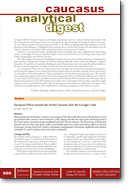My Friend's Enemy is My Friend

Armenian Foreign Policy between Russia, Iran and the United States
Author(s): Mikayel Zolyan
Editor(s): Iris Kempe, Matthias Neumann, Robert Orttung, Jeronim Perovic, Lili Di Puppo
Series: Caucasus Analytical Digest (CAD)
Issue: 13
Pages: 2-5
Publisher(s): Center for Security Studies (CSS), ETH Zurich; Jefferson Institute, Washington D.C.; Heinrich Böll Foundation, Tbilisi; Research Centre for East European Studies, University of Bremen
Publication Year: 2010
